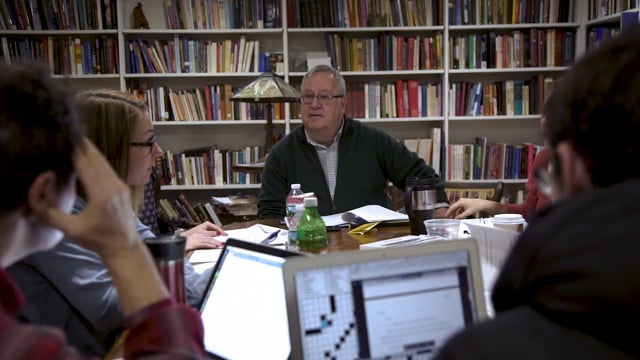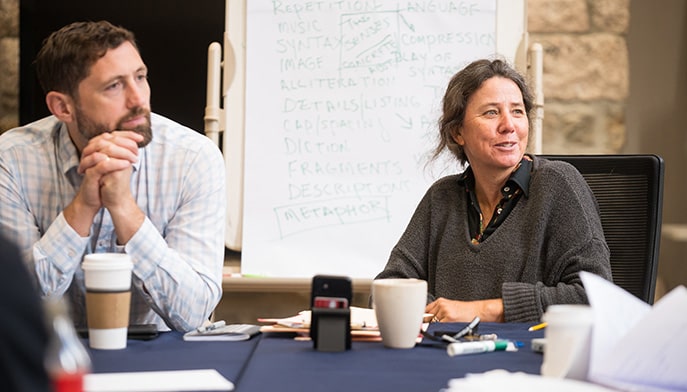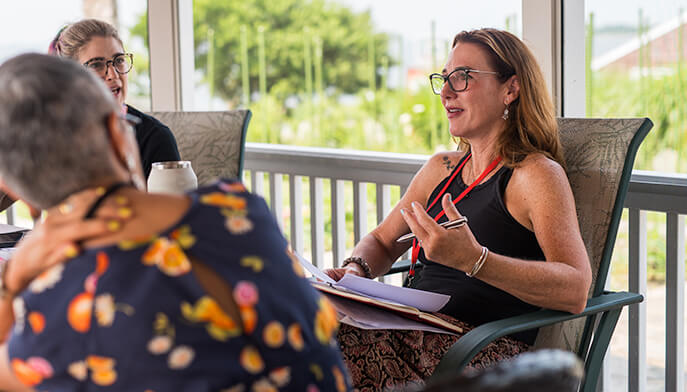Fairfield University is uniquely qualified to offer an MFA concentration in “Spiritual Writing.” Our MFA faculty are widely published and well versed in the varieties of spiritual writing, having published books of poetry, memoir and fiction that relate to issues of spirituality in the broadest sense.
Additionally, Fairfield has a wealth of full-time faculty on the Fairfield campus whose expertise and background we are able to draw upon to offer our students timely lectures at the residency on various aspects of spirituality and writing; such lectures underpin the requirements for the concentration and strengthen it. Furthermore, our Inspired Writer author series as well as in our broad range of spiritual, philosophical, and theological lectures on campus would prove to be a wonderful supplement for our students’ educational development as writers on spiritual issues.
In addition to situating their study of writing within the writer’s chosen genre of fiction, non-fiction, or poetry, Fairfield M.F.A. students are also invited to concentrate their studies within the area of Spiritual Writing. The faculty teaching in this part of the program broadly defines the term spiritual writing to include organized religion alongside faith traditions and spiritual practices that thread themselves throughout many literary traditions and throughout the whole of human experience. Students may study spiritual writing thematically, or examine the writing process as spiritual practice, or discover, through workshops, what aspects of spiritual writing inform their own work.
One of several concentration choices designed to enhance students’ experience of writing within their chosen genre, the spiritual writing concentration aims to deepen students’ own participation in framing important, age-old questions in ways that mirror the reflective and meditative practices that underpin their own writing life.
Workshops will be offered each residency that allow students to explore various aspects of this topic whilst continuing to work in their genre. Such workshops include but are not limited to “Writing as Spiritual Practice,” “The Spirit in Nature,” “Revelation and Post-Revelation across Genre,” “Writing about Loss,” “The Spirit and the Body,” and “Nature and Spiritual Writing.” The student’s semester reading will be developed around the theme of spiritual reading. The third semester project and a substantial portion of the thesis should be engaged on some level with spiritual writing, and the introduction to the student’s thesis will address the way in which spirituality informs the work completed. Below is a sample reading list for the student interested in pursuing a concentration in spiritual writing.
Spiritual Writing: Partial Reading List (Poetry)
- Selections from John Donne, George Herbert, G.M. Hopkins, Thomas Merton, George Oppen, W. S. Merwin, Elizabeth Bishop, Li-Young Li, Emily Dickinson, Jalal ad-Din Rumi, Ranier Maria Rilke.
- Duino Elegies
- John Berryman, 77 Dream Songs
- Anne Carson, Plainwater
- Dara Wier, Reverse Rapture
- John Ashbery, Flow Chart
Prose (About Process or Craft)
- Lewis Hyde. The Gift.
- James Lord. A Giacometti Portrait.
- Ranier Maria Rilke. Letters to a Young Poet.
- Wallace Stevens. The Necessary Angel.
- Basho. Narrow Road to the Deep North.
- Dillard, Annie. The Writing Life.
Short Story Collections
- Atwood, Margaret. Moral Disorder
- Some of Chekhov’s stories, such as “The Bishop” and “The Student.”
- Joyce, James. Dubliners, including “The Dead.”
Novels
Hawthorn. The Scarlet Letter.
Cather, Willa. Death Comes for the Archbishop.
Woolf, Virginia. To the Lighthouse.
Kingsolver, Barbara. The Poisonwood Bible.
Morrison, Tony. Beloved.
Melville, Herman. Moby Dick.
Patchett, Anne. Bel Canto.
Banks, Russell. The Sweet Hereafter.
Harrison, Ron. Mariette in Ecstasy.
Erdich, Louise. Love Medicine.
Erdich, Louise. The Round House.
Enright, Anne. The Gathering.
Martin, Valerie. Trespass.
Martin, Valerie. Property.
Lightman, Alan. Einstein’s Dreams.
Obreht, Ta. The Tiger’s Wife.
White, Michael. The Garden of Martyrs.
Robinson, Marilynn. Gilead.
Robinson, Marilynn. Home.
Schlink, Bernhard. The Reader.
Strout, Elizabeth. Abide with Me.
Giardina, Denise. Saints and Villains.
Osborn, Karen. Centerville.
Basch, Rachel. The Passion of Reverend Nash.
Pamuk, Orhan. Snow.
Saramago, Jose. The Stone Raft.
Homer. The Odyssey.
Roy, Arundhati. The God of Small Things.
Coelho, Paulo. The Alchemist.
Hesse, Hermann. Siddhartha.
C.S. Lewis. The Screwtape Letters.
Martel, Yann. Life of Pi.
Bunyan, John. Pilgrim’s Progress.
Diamant, Anita. The Red Tent.




